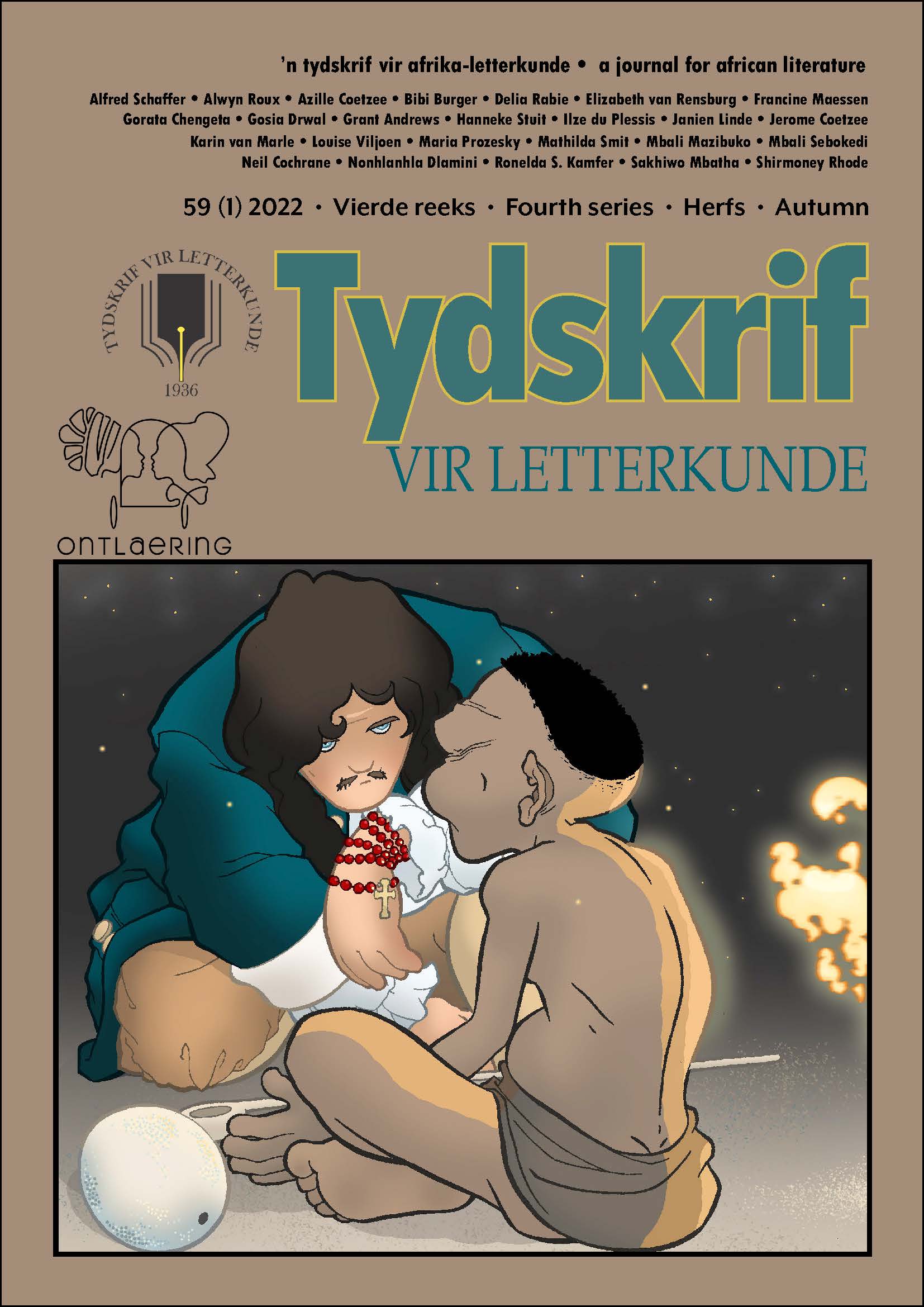The construction of split whiteness in the queer films Kanarie (2018) and Moffie (2019)
DOI:
https://doi.org/10.17159/tl.v59i1.12163Keywords:
South African film, queer film, Afrikaner culture, gay white characters, whitenessAbstract
After the end of formal apartheid, a number of South African feature films have explored queer white men in conservative social settings, with a particular focus on Afrikaans-speaking gay men. These films have reflected strict heteropatriarchal values within white Afrikaner culture where homosexuality is still often seen as a taboo topic. In this article I discuss two feature films with gay white male protagonists, Kanarie (2018) by Christiaan Olwagen and Moffie (2019) by Oliver Hermanus. These films both feature young men conscripted to fight in the South African Border War in the 1980s, but differ greatly in terms of genre, plot, and style. I argue that, while many scholars discuss whiteness as a general construct that affords privilege, the films demonstrate a split whiteness that is effected through the composition of particular shots and scenes as well as through the films’ processes of production and reception. Whiteness is split into an invisibilised, assumedly critical perspective on the one hand, with transnational links to the Global North, and a hypervisibilised, reified, and criticised racial identity on the other hand, located specifically in the heteropatriarchal Afrikaner male. Queer characters in both films are able to split their identities and dissociate from uncomfortable parts of their whiteness, taking on an assumed criticality that highlights their own oppression and exclusion. The films thus dismiss the protagonists’ complicity in white supremacy, and allow audiences to dissociate from their own complicity in anti-black violence and oppression.
Downloads
References
Andrews, Grant. “The Boundaries of Desire and Intimacy in Post-Apartheid South African Queer Film: Oliver Hermanus’s Skoonheid.” Image & Text : A Journal for Design vol. 31, no. 1, 2018, pp. 30–47.
Broodryk, Chris Willem. “Absences, Exclusivities and Utopias: Afrikaans film as a cinema of political impotence, 1994–2014.” Diss. U Cape Town, 2016. https://open.uct.ac.za/handle/11427/20299.
Carolin, Andy. Post-Apartheid Same-Sex Sexualities. Routledge, 2020.
Dercksen, Daniel. “Charl-Johan Lingenfelder talks about the astounding new South African film Kanarie.” The Writing Studio. 16 Oct. 2018, https://writingstudio.co.za/charl-johan-lingenfelder-talks-about-the-astounding-new-south-african-film-kanarie/.
_____. “Writer-director Etienne Kallos talks about Die Stropers (The Harvesters).” The Writing Studio. 10 Mar. 2019. https://writingstudio.co.za/writer-director-etienne-kallos-talks-about-die-stropers-the-harvesters/.
Dyer, Richard. White: Essays on Race and Culture. Routledge, 1997.
Falkof, Nicky. “ENG/AFR: White masculinity in two contemporary South African films.” Critical Arts vol. 30, no. 1, 2016, pp. 15–30. DOI: https://doi.org/10.1080/02560046.2016.1164382.
Gevisser, Mark. “‘Moffie’ and Me.” The New York Review. 3 May 2021. https://www.nybooks.com/daily/2021/05/03/moffie-and-me/.
Gray, Chantelle. “The Spectre-Image: A Hauntology of Skoonheid and Kanarie.” Image & Text: A Journal for Design vol. 35, 2021, pp. 1–21. DOI: https://doi.org/10.17159/2617-3255/2021/n35a3.
Green-Simms, Lindsey B. Queer African Cinemas. Duke U P, 2022.
Henderson, Odie. “Moffie Movie Review.” Roger Ebert.com. 9 Apr. 2021. https://www.rogerebert.com/reviews/moffie-movie-review-2021.
Hermanus, Oliver. Moffie. Portobello Productions, Department of Trade and Industry of South Africa, 2019.
Janks, Hilary & Kerryn Dixon. Doing Critical Literacy: Texts and Activities for Students and Teachers. Routledge, 2013.
Jones, Tiffany F. “Averting White Male (Ab)Normality: Psychiatric Representations and Treatment of ‘Homosexuality’ in 1960s South Africa.” Journal of Southern African Studies vol. 34, no. 2, 2008, pp. 397–410. DOI: https://doi.org/10.1080/03057070802038058.
Macoun, Alissa. “Colonising White Innocence: Complicity and Critical Encounters.” The Limits of Settler Colonial Reconciliation: Non-Indigenous People and the Responsibility to Engage, edited by Sarah Maddison, Tom Clark & Ravi de Costal. Springer, 2016, pp. 85–102. DOI: https://doi.org/10.1007/978-981-10-2654-6_6.
Ncube, Gibson. “Queer Afrikaner masculinities in Oliver Hermanus’ Skoonheid (2011) and Christiaan Olwagen’s Kanarie.” Stilet vol. 33, no. 1, 2021, pp. 94–9.
Olwagen, Christiaan. Kanarie. Marche Media, kykNET, 2018.
Phamodi, Sekoetlane. “Hermanus’s Acclaimed ‘Moffie’ Is Probably Not for Black Queers.” OkayAfrica. 24 Jul. 2020. https://www.okayafrica.com/south-africa-reframed-oliver-hermanus-moffie-film-critique/.
Pieterse, Annel. “Film notes: masculinity, violence, and queer identity in recent South African Films.” Safundi vol. 20, no. 3, 2019, pp. 375–81. DOI: https://doi.org/10.1080/17533171.2019.1601443.
Sonnekus, Theo. “‘We’re Not Faggots!’: Masculinity, Homosexuality and the Representation of Afrikaner Men Who Have Sex with Men in the Film Skoonheid and Online.” South African Review of Sociology vol. 44, no. 1, 2013, pp. 22–39. DOI: https://doi.org/10.1080/21528586.2013.784446.
Steenkamp, Emelia. “Textures and Entanglements of Contemporary Afrikaner Cinema.” MA Thesis. U Cape Town, 2019. https://open.uct.ac.za/handle/11427/30518.
Van der Merwe, André Carl. Moffie. Penstock, 2006.
Verwey, Cornel & Michael Quayle. “Whiteness, racism, and Afrikaner identity in post-apartheid South Africa.” African Affairs vol. 111, no. 445, 2012, pp. 551–75. DOI: https://doi.org/10.1093/afraf/ads056.
Published
Issue
Section
License
Copyright (c) 2022 Tydskrif vir Letterkunde

This work is licensed under a Creative Commons Attribution-ShareAlike 4.0 International License.


 https://orcid.org/0000-0001-6465-6584
https://orcid.org/0000-0001-6465-6584


.png)